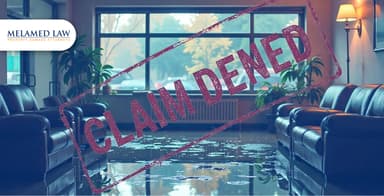
Steps to Take When Your Insurance Company Acts in Bad Faith in Florida
When the unexpected happens, we help individuals and businesses collect the money they deserve for their insurance claims.
Melamed Blogs
May 15, 2025
Steps to Take When Your Insurance Company Acts in Bad Faith in Florida

Life is full of uncertainties, but some betrayals feel sharper than others. You pay for insurance, believing it will be there when you need it. Then, when disaster strikes, you find yourself not just battling the damage but the very company that promised to help. Denied claims, endless delays, offers so low they feel like an insult—it’s not just frustrating. It’s a reminder that the system was never built for you.
However, Florida law offers a way to push back, to demand what you’re owed. The question is, how do you fight an opponent that holds all the cards? Let’s walk through the steps—what to do when the company you trusted turns its back, and how to make sure they don’t get away with it.
Step 1: Recognize the Signs of Bad Faith Insurance Practices
Insurance companies have a legal duty to handle claims fairly. However, some try to avoid paying what they owe. If you suspect your insurance company is acting in bad faith, look for these red flags:
Unreasonable claim denial without a valid reason: If your claim is denied without a clear explanation or based on an unreasonable interpretation of your policy, the insurance company may be acting in bad faith. A legitimate denial should be backed by specific policy terms, not vague or shifting reasons.
Delays in processing your claim without explanation: While some claims take time to process, the insurance company must keep you informed. If you’ve submitted everything required and they consistently delay without a valid reason, they could be trying to avoid paying your claim.
Lowball settlement offers far below what you’re owed: Some insurance companies offer far less than what a claim is worth, hoping you’ll accept out of frustration. If the offer doesn’t align with the damages covered in your policy, it could be a deliberate practice to underpay.
Lack of communication or failure to respond to your inquiries: A responsive insurance company should acknowledge your inquiries, provide updates, and explain their decisions. If they ignore your calls or emails, fail to provide requested information, or make it difficult to get answers, they may be acting in bad faith.
Step 2: Review Your Insurance Policy for Coverage Details

Before challenging an insurance company’s decision, it’s important to know exactly what your policy includes. Reviewing your policy helps you determine whether the insurance company is fulfilling its obligations or unfairly denying coverage.
The types of damages and losses covered: Your policy outlines the specific damages and losses the insurance company has agreed to cover. This can include structural damage, personal property losses, additional living expenses, and other protections. Understanding these details can clarify whether your claim falls within the policy’s scope.
Any deadlines for filing claims or disputes: Insurance policies often outline specific steps that must be followed when filing a claim or disputing a decision. These guidelines detail how claims should be submitted, what supporting documents may be required, and the process for resolving disagreements with the insurance company. Following these procedures correctly can help strengthen your position.
The insurance company’s obligations under Florida law: Insurance companies in Florida must follow legal guidelines when processing claims. This includes handling claims in good faith, providing clear explanations for their decisions, and making fair settlement offers. If an insurance company fails to meet these obligations, it may be acting in bad faith.
Step 3: Gather Evidence to Support Your Claim
When dealing with an insurance company, thorough documentation can strengthen your position. Keeping detailed records ensures you have proof of your claim and can help demonstrate if the insurance company is not handling it fairly. Be sure to:
Keep copies of emails, letters, and claim forms: Save copies of all emails, letters, and claim forms exchanged with the insurance company. These documents can serve as evidence of how your claim was handled and whether the company provided clear explanations for its decisions.
Document phone calls, including dates and representative names: Keep a log of phone calls, including the dates, times, and names of the representatives you spoke with. If any promises or instructions were given over the phone, note them down to avoid disputes later.
Take photos and videos of the damage: Visual evidence can be important in proving the extent of the damage. Take clear photos and videos from multiple angles, ensuring they accurately capture the condition of your property. This can help counter any attempts by the insurance company to undervalue your claim.
Save receipts for temporary repairs or additional expenses: If you paid for temporary repairs or other necessary expenses while waiting for the claim to be resolved, keep all receipts. These records help establish the financial impact of the damage and what the insurance company should cover.
Step 4: Request a Written Explanation from the Insurance Company

Under Florida law, if your insurance company has denied or delayed your claim, you have the right to ask for a clear, written explanation. Request:
A detailed explanation for their decision: Ask the insurance company to provide a written statement outlining the specific reasons for the denial or delay. This can help identify whether they are acting within the terms of your policy or unfairly withholding coverage.
A breakdown of how they calculated your settlement: If the insurance company has offered a lower settlement than expected, request a detailed breakdown of how they arrived at the amount. Understanding their calculations can help you determine whether the offer is fair or if further action is needed.
Check out more related content to expand your knowledge.
What Are the Most Common Reasons for Residential and Commercial Property Insurance Claim Rejections?
How does hurricane insurance coverage differ from standard homeowners insurance policies?
Protect Yourself from Bad Faith Insurance with Melamed Law PLLC

When an insurance company refuses to handle a claim fairly, we step in to hold them accountable. We fight for policyholders who have been wronged, ensuring they receive the compensation they are entitled to under their policies. This is how we support our clients in securing the compensation they are owed:
Negotiating for a Fair Settlement
We take over all communications with the insurance company, demanding that they process the claim fairly and promptly. We push back against lowball offers, present strong evidence, and insist on full compensation for covered losses. If the insurance company refuses to cooperate, we escalate the matter as necessary.
Investigating the Insurance Company’s Conduct
Bad faith insurance claims require proof that the insurance company intentionally mishandled the claim. We thoroughly investigate their actions, review correspondence, and determine whether they violated Florida’s insurance laws.
Filing a Civil Remedy Notice (CRN) to Force the Insurance Company
We handle the filing of a Civil Remedy Notice (CRN), a legal warning that forces the insurance company to respond within a set timeframe.
Exploring Mediation or Arbitration for a Faster Resolution
Not every client wants to go to court. If a quicker resolution is preferred, we explore options such as mediation or arbitration. In mediation, a neutral third party helps both sides reach an agreement. In arbitration, a legal expert reviews the case and makes a binding decision.
These options can be faster and less expensive than a lawsuit. However, if the insurance company refuses to cooperate, we are fully prepared to take legal action.
Filing Lawsuits for Bad Faith Insurance Practices
If an insurance company continues to delay, deny, or underpay a valid claim, we take legal action. Florida law allows policyholders to sue for bad faith, and we aggressively represent our clients in these cases. We fight to ensure the insurance company is held accountable for its misconduct.
Helping Recover Additional Damages Beyond the Claim
When an insurance company acts in bad faith, the financial consequences can extend beyond the original claim. Clients may face increased repair costs, temporary housing expenses, or other financial hardships due to unfair claim handling. We pursue additional compensation, including penalties against the insurance company, to cover these extra losses.
Protecting Future Insurance Rights
We offer guidance on how to document future claims, handle interactions with insurance companies, and choose companies that uphold their obligations. Our goal is to ensure that our clients are never taken advantage of again.
If your insurance company refuses to treat your claim fairly, contact us. We’re here to help you hold them accountable and secure the compensation you're rightfully owed.
Recent Cases














































